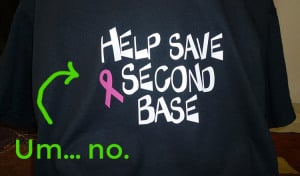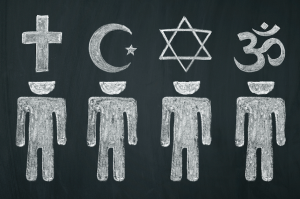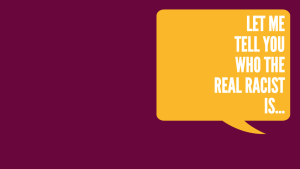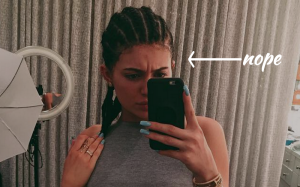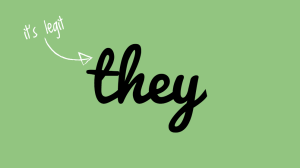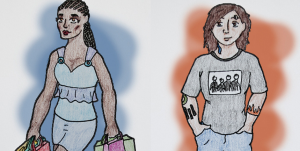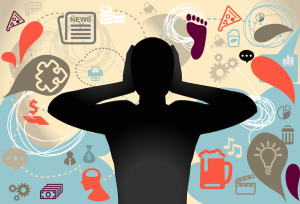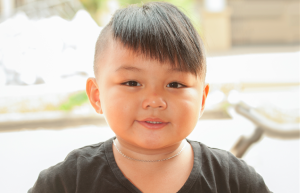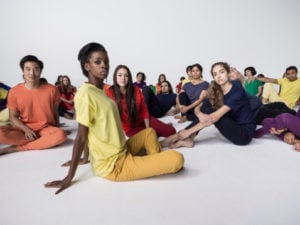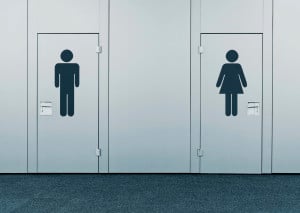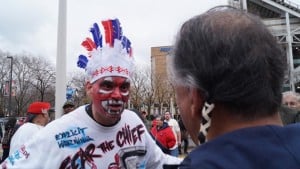
Cleveland Indians fan defending the Chief Wahoo mascot to protesters. Credit: Sam Allard / Scene.
Someone is a human being. Something is a mascot. And when it comes to Native Americans, sports franchises have placed us in the latter category time and time again.
With the Super Bowl right around the corner, the current conversation about racist mascots centers on NFL teams, namely the Washington Redskins, as well as the Kansas City Chiefs.
But the fun continues year-round: MLB’s Cleveland Indians and the Atlanta Braves are major league offenders, and the NHL’s Chicago Blackhawks need to retire their logo, as well. More than 2,000 high school, college, pro, and semi-pro sports teams are also on my list.
After I wrote my first column for my high school newspaper in 2000 against the University of North Dakota’s Fighting Sioux nickname and logo, I received huge backlash from the student body and faculty.
They called me stupid and overly sensitive, told me how the mascot honored Natives like me, asked why I wanted to tear down a tradition several decades old, and generally tried to steer me toward Native issues that really mattered.
And while I was adamantly against Indian mascots, while heat flushed my face and my fists shook with anger and embarrassment, I didn’t have the facts, the poise, or the words to shut their statements down.
And my ignorance and lack of comeback validated them.
I spent the next 14 years building my arsenal. I read study after study after study (after study after study), followed the women who’ve been fighting against Indian mascots for decades (Dr. Adrienne Keene, Dr. Stephanie Fryberg, and Suzan Shown Harjo, among many others), participated in protests, and discovered how to present information in ways I was comfortable with.
So in honor of the Super Bowl, I give you seven simple yet effective responses to use against the most common (and illogical) excuses favored by Indian mascot supporters.
1. “This mascot honors Natives.”
Using Native Americans and associated images as mascots, logos, and nicknames of sports teams does the opposite of honor — it dehumanizes. And when you dehumanize Native Americans as mascots, it’s easy to cast aside and ignore our struggles and perspectives. (see No. 5).
This is about who has the power to decide how marginalized groups are represented. Mascots aren’t racist, because you, personally, aren’t offended. This is what we call privilege.
Mascots seem to be the only Natives that America cares about. Seriously, if sports fans honored Native people like they honor our images and appropriate our culture, we’d be set.
Mascots are entertainment. They’re meant to symbolize a sports team, not 566-plus sovereign nations, their histories and contemporary issues.
For instance, the vast majority of Indian mascots are based on images stereotyping Natives from the Great Plains region.
And these stereotypes dehumanize. Caricatures — such as cartoons like Chief Wahoo — dehumanize. Dictionary-defined racial slurs like redskin dehumanize.
All these tactics create one-dimensional views of Native people. Redface, war chants, war paint, costumes… These reduce Natives to violent, aggressive, testosterone-fueled savages of the past that can be mocked, ridiculed, and violated by fans of opposing teams. Or we’re held up as some kind of lucky charm, akin to a rabbit’s foot, when the team wins, or as a mystical curse, when the team loses.
Honor assumes the receiving party feels something positive, like pride, at the association. And as myself and many other Native Americans have said, we do not feel proud of this association.
Not to mention that honor implies respect of something — and if the harassment, and bullying toward peaceful anti-mascot protesters at several of this season’s NFL games have shown anything, it’s that these fans do not respect the voices of Native Americans.
2. “It’s tradition!”
Whose tradition?
The traditions of my Lakota people go back to time immemorial, passed down generation to generation for survival and progress. Your mascot is 100 years old.
Things change. And retiring racist mascots would be a change for the better.
Let’s look at the time in history these Indian mascots were launched. For many, we’re talking the early 1900s, a time following the end of the Indian wars, particularly those nations of the Great Plains, the last holdouts of the United States’ efforts to colonize the Wild West.
This was a time when many considered Native Americans “the vanishing race.” Being Indian was en vogue, tribal artifacts swept up at auction, nostalgic photographs taken of Indians before they died out, and items were created and marketed with Indian images and characters.
We were memorialized and mythologized, even as we struggled to survive under the new conditions of reservation life.
So it makes sense that the images chosen for school and sports mascots during this time depicted noble, stoic savages of the past. The real “tradition” mascots honor and uphold is the idea of a passive, silent, defeated, and nonexistent Indian.
This makes it difficult for people to validate us today.
Being loud at protests, on news shows, and on social media — demanding change — subverts the systems of oppression and changes the dynamic of that noble, stoic Indian America has grown accustomed to.
I propose this is the tradition we should be honoring – that of a Native American who is active and vocal in ways that will promote progress.
3. “If we get rid of the Indian mascot, then we’ll have to get rid of the Vikings and Fighting Irish and Cowboys. The animal rights people will be demanding we get rid of animal mascots next. Is there no end?!”
Vikings, Padres, Cowboys – those are professions, not a race of people. The Fighting Irish mascot is a leprechaun – a mythological creature.
While some are offended by these mascots (and I wholeheartedly validate their feelings and right to be offended), Scandinavians, the Irish, clergy, and ranchers have never experienced oppression or genocidal policies at the hands of the US government. In fact, folks within these groups have experienced positions of immense power in the US.
My people confront active systems of colonial-based oppression to this day.
Finally, the argument that to retire Indian mascots means non-human animal mascots will also be protested demonstrates just how much our culture dehumanizes Native Americans.
It reveals how indigenous people are viewed with the same oppressive bottom-of-the-food-chain lens used to validate our violent and abusive treatment of non-human animals.
Sports franchises depict them as fierce, strong, and wild. Indians get the same treatment. But we deserve to have the fullness of our humanity acknowledged.
We are people, not metaphors for non-human aggression.
4. “I’m Native American and I approve this message.”
This is not a valid argument. One token does not consent make.
Lots of bad ideas – slavery, the Holocaust, the Bush Administration – were supported by the masses. Doesn’t make them okay.
The Civil Rights Act, voting rights for women… these things would have never been approved if popular (read: privileged) opinion were the deciding factor.
Lots of folks like to cite this poll, conducted for an article by Sports Illustrated back in 2002, which shows a vast majority of Natives support Indian mascots. But when you look at the (lack of) methodology used, the poll has a lot of problems, namely that they polled just 300-some Natives.
At the time of this poll, there were more than 550 unique sovereign nations — federally recognized tribes — in the US. That tells me some tribes were completely left out of the sample.
And even if they did manage to poll at least one person from each of 300 different tribes, how does that in any way represent a firm “Native American opinion?” That’s like saying you polled one person from each country to prove the world agreed global warming is a hoax.
Yes, there are tribes who pass resolutions to officially endorse a name or image.
But it’s not hard to figure out why when you follow the money.
When you see colleges and sports team parade out their indigenous supporters garbed head-to-toe in logo wear, keep in mind the economic hardships and rampant poverty plaguing many Native people nationwide.
While these folks make my job harder as an activist, I don’t blame them. Studies — we’re talking solid data backed up by science, academics, and peer-reviews, folks — show mascots harm Native people on a psychological level.
One of my heroes, Dr. Stephanie Fryberg, led some of these studies.
“She has found empirical proof that those names and imagery lead to lowered self-esteem and sense of community worth among American Indian kids. They also damage aspirations and heighten anxiety and depression,” according to an article in Psychology Today. “In other words, seeing their people reduced to mascots is toxic to Indian children.”
Interesting tidbit: The American Psychological Association has been officially against the use of Indian mascots since 2005. Anyone who takes the word of Sports Illustrated over APA needs to rethink their priorities.
When you’ve got generations of Native people being exposed to Indian mascots, it’s a no-brainer some of that psychological damage will take on a Stockholm or Uncle Tomahawk effect.
5. “Don’t Native Americans have more important things to worry about?”
I know you’ve been primed to see Natives as simple and one-dimensional, but we’re human beings capable of taking an active interest in many subjects.
More importantly, we’ve realized over time that Indian mascots exacerbate the issues Native people face in their communities, because dehumanization leads to negative thoughts and feelings (see No. 4).
A lot of those feelings are tied directly to the relationship the rest of America has with its sovereign tribal neighbors: The stereotypes that make up the heart of Indian mascots render real Natives — and our real issues — as immaterial.
Mascots push us to the margins, where those in power are fine with us being.
And yet we still find time to rally against youth suicide, oil pipelines, and police brutality. We advocate for our missing and murdered indigenous women, language revitalization, and the environment. We worry about our kids getting good educations, good healthcare, and being treated fairly by the justice system. Because we’re human beings.
6. “So do we have to get rid of mascots and names like the warriors and chiefs and tomahawks and savages and…?”
Yes. Images of tomahawks, spears, arrows, and disembodied heads — what we call Native-themed or Native-related imagery — need to go. These words and images all play into the stereotypes and marginalization of Native people.
Even something as innocuous as the word “warrior,” which can describe fighters from many cultures, can be considered an Indian mascot when you couple it with a feather or color the letters red and black. The associations people make goes back to the stereotypical Indian we discussed in No. 2 above.
Not to mention, all these Indian mascots are related to violence and aggression. They have been used historically to present us as non-human.
“Redskin” referred to the bloody skin bounty hunters needed as proof to collect their payments, and killing “savages” or “raiders” was easier and more justifiable than killing a fellow human being.
7. “You’re being too sensitive.”
Please, tell me more about how I should feel. Those who have privilege do not get to decide what should or should not offend Native people.
Beyond this, the word “offensive” is the worst kind of double-speak shading the reality of what Indian mascots are: Racist. This isn’t about being offended. This is about racism and ending racism in sports.
Mascots dehumanize. They place Native people into an entertainment category no other ethnic or political entity today must endure.
***
As you trek into the murky waters of Indian mascots, keep this in mind: Don’t throw other races under the bus to prove a point.
I violated this rule in my early advocacy days. I would point out that you wouldn’t see a team like the Cleveland Orientals or have an NFL mascot running around the field in overalls and blackface — then I’d ask why it was okay to subject Natives to such stereotypes.
But triggering fellow minorities with satire or highlighting double standards with racist words and images is not the way to prove Indian mascots are wrong. It further divides our efforts for solidarity.
With enough pressure and media coverage of mascot protests, it’s likely major franchises will begin dumping unpopular mascots in favor of healthier nicknames. Good riddance, Redskins and Chief Wahoo. We knew ye too long.
In Colorado, where I live, there’s rumor of a bill to be introduced this legislative session that will address local teams’ use of Indian mascots. Other states are considering bans, as well.
I am optimistic. With ally support, retiring these mascots is possible.
[do_widget id=”text-101″]
Taté Walker is a Contributing Writer for Everyday Feminism. She is Mniconjou Lakota and an enrolled citizen of the Cheyenne River Sioux Tribe. She lives in Phoenix and is the editor of Native Peoples magazine. Contact her at www.jtatewalker.com and read her articles here.
Search our 3000+ articles!
Read our articles about:
Our online racial justice training
Used by hundreds of universities, non-profits, and businesses.
Click to learn more





